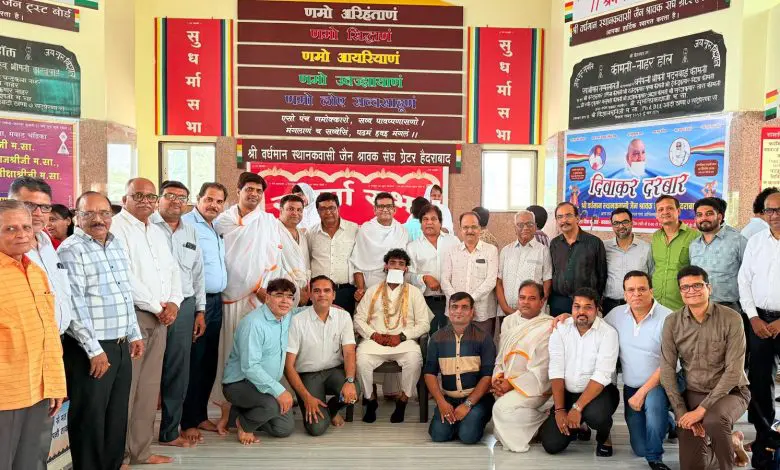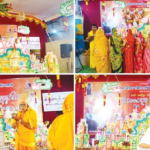Hyderabad, Those who possess control over their mind possess dignity. The mind races faster than anything in the world and constantly drives a person forward. Humans become slaves to their minds, obeying its commands. We did not come into this world to be enslaved by the mind, but to make the mind our slave. If one conquers the mind, the five senses also come under control.
Without refining ourselves, we cannot become divine, and without refining the mind, we cannot become like Mahavira. The irony is that we should ride the mind like a horse, but instead, we have become the horse, running at its whims. In other words, we have become puppets of the mind, dancing to its tune.
Refusal to Bow Due to Ego Is the True Defeat
These thoughts were expressed by Sadhvi Jayashriji during the Chaturmas religious assembly at Shri Poonamchand Gandhi Sthanak in Kachiguda. She stated that humans desire success and victory in every field but sometimes face defeat. Defeat comes in two forms: one when we lack strength, and the other when, despite being powerful, we still lose. Where do we face such defeat? With our brothers, relatives, or neighbors—yet we never accept it. If a dispute arises with a brother or neighbor, would we admit defeat and bow before them? No, we refuse.
Read also…
True Elevation Comes from Controlling the Mind
Though we must accept defeat sometimes, our mind never does. Even if we conquer the world, we kneel before our own mind. The mind wanders everywhere—even if we sit in a temple, our mind may roam elsewhere. The speed of the mind surpasses even that of the gods; in the blink of an eye, it can travel abroad. If a pilgrimage site is mentioned during a sermon, its image appears in our minds, though we remain seated in the temple.
Catching a restless thief is easy, but capturing the mind is difficult. Only one in a million can ride the mind like a horse instead of becoming its slave. Meditation fails with a wandering mind. Where there is mind, there is ego (māna). Without the mind, there is no ego—animals have no ego because they lack a mind.
Ego makes a person fall from grace, even if they are a saint seated on a throne. A single word from the divine can shatter ego. Just as Chandakaushik’s pride broke upon hearing two words from Lord Mahavira, leading him to purify his karma through penance. Everyone wants to be great, but greatness is not easily achieved.
True Greatness Lies in Conduct, Not Wealth
Wealth does not make one great—conduct and behavior do. Ravana and Duryodhana were wealthy, and Queen Shri Devi, the chief among 64,000 queens of Chakravarti, was consumed by pride—all ended in the seventh hell. This proves wealth does not bring greatness.
During the assembly, it was announced that Master Roopchand Parmar is observing his third fast today. Tomorrow, Anil Surana’s fast will begin. Today’s Ayambil was observed by Sarita Kamdar. The benefits of today’s Navkar Mahamantra chanting were dedicated to the Gautamchand Pawan Aman Ankush Hriday Pokarana family. Tapasvi Adesh Pincha’s nine-day fast was honored with a bid for five fasts by Mahendra Lunavat. The Gautam Prasad ceremony was organized by Rajendra Kumar Pincha’s family in recognition of the nine-day fast.
Megha Pincha and Khushi Kathotiya presented devotional hymns. Tapasvis observing eight or more fasts during Chaturmas were honored by Gautamchand Kamal Kishor Dank’s family. The upcoming birth anniversary of Guruvarya on July 27 aims to offer 1008 Ekasan. On July 25
Shri Poonamchand Gandhi Sthanak
Shri Poonamchand Gandhi Sthanak is a Jain religious site dedicated to Shri Poonamchand Gandhi, a revered Jain figure. Located in India, it serves as a place of worship and meditation for followers of Jainism, emphasizing non-violence (ahimsa) and spiritual purity. The site reflects Jain architectural simplicity and is historically significant for its association with the Jain community’s cultural and religious heritage.
Mahavira
Mahavira, also known as Vardhamana, was the 24th and last Tirthankara (spiritual teacher) of Jainism, born around the 6th century BCE in present-day Bihar, India. He renounced worldly life at 30, practiced intense asceticism, and achieved enlightenment (kevala jnana), teaching principles of non-violence (ahimsa), truth, and detachment. His teachings form the core of Jain philosophy, and he is revered as a key figure in the religion’s history.
Chandakaushik
Chandakaushik is a revered religious site in Nepal, associated with the legendary serpent deity Chandakaushik Nag (a form of the Nāga). According to local folklore, the deity is believed to protect the region and fulfill devotees’ wishes. The site features a temple and a sacred pond, attracting pilgrims seeking blessings and spiritual solace.
Lord Mahavira
Lord Mahavira, the 24th and last Tirthankara (spiritual teacher) of Jainism, is a central figure in Jain tradition who lived in the 6th century BCE in ancient India. Renouncing his royal life, he practiced extreme asceticism and preached the principles of non-violence (ahimsa), truth, and detachment. His teachings form the foundation of Jain philosophy, emphasizing spiritual liberation through ethical living and meditation. Temples and statues dedicated to him, such as those in Palitana or Shravanabelagola, are important pilgrimage sites for Jains.
Ravana
Ravana is a prominent figure in Hindu mythology, best known as the primary antagonist in the ancient epic *Ramayana*. As the demon king of Lanka (often associated with modern-day Sri Lanka), he is depicted as a powerful but arrogant ruler who abducts Sita, the wife of Lord Rama, leading to a great war. Despite his villainous role, Ravana is also revered in some traditions as a learned scholar and devotee of Shiva, symbolizing the complexity of good and evil.
Duryodhana
Duryodhana is a prominent figure in the ancient Indian epic *Mahabharata*, known as the eldest of the Kauravas and the main antagonist in the Kurukshetra War. As the son of King Dhritarashtra, his rivalry with the Pandavas, particularly over the throne of Hastinapura, led to a great war and his eventual downfall. While not a physical place, Duryodhana’s legacy is tied to key sites in the *Mahabharata*, such as Hastinapura and Kurukshetra.
Queen Shri Devi
“Queen Shri Devi” (also known as Palden Lhamo) is a revered protective deity in Tibetan Buddhism, often depicted as a wrathful guardian. She is considered the consort of Mahakala and is believed to safeguard the Dharma and its followers. Historically, she has been worshipped as a divine protector in Himalayan regions, particularly in Tibet and Mongolia, where her iconography appears in monasteries and thangkas.
Chakravarti
“Chakravarti” is a term from ancient Indian philosophy and history referring to an ideal universal ruler who governs ethically and maintains harmony. In Hinduism, Buddhism, and Jainism, a *Chakravartin* (Sanskrit for “wheel-turner”) symbolizes a monarch whose dominion is vast and just, often linked to spiritual enlightenment. While not a physical site, the concept reflects the cultural and political ideals of ancient Indian civilizations, emphasizing righteous leadership and cosmic order.






